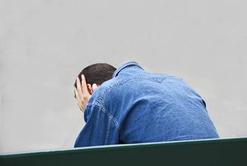 The 10th September was World Suicide Prevention Day. Suicide is the single biggest killer of men under 45. The World Health Organization estimates that over 800,000 people die by suicide each year – that’s one person every 40 seconds. Up to 25 times as many again attempt suicide. Time does not heal, it makes a half-stitched scar that can be broken and again you feel grief as in its first hour. – Elizabeth Jennings The 10th September was World Suicide Prevention Day. Suicide is the single biggest killer of men under 45. The World Health Organization estimates that over 800,000 people die by suicide each year – that’s one person every 40 seconds. Up to 25 times as many again attempt suicide. The tragic ripple effect means that there are many, many more people who have been bereaved of suicide or have been close to someone who has tried to take his or her own life. It is a catastrophe that 12 men die by their own hand every day in the UK. Sue Klebold writes in A Mother’s Reckoning on making plans for her son’s cremation:” …the only sound I could hear in my own head was a continuous, endless screech of agony and disbelief. This was my son, the person I had nurtured, protected, and loved with all my heart. The thought that I would never hear his voice or touch his face again took my breath away.” Her son, Dylan – along with his friend Eric – killed 12 students and a teacher before taking his own life in 1999 at Columbine High School, US. Another mother said after the death of her 19-year-old son by his own gunshot: “I feel like a mother animal. I keep searching for my baby.” Kay Redfield Jamison writes in her hugely authoritative study on understanding suicide, Night Falls Fast, that “Suicide is a death like no other and those who are left behind to struggle with it must confront a pain like no other.” She continues: “Death by suicide is not a gentle deathbed gathering: it rips apart lives and beliefs, and sets its survivors on a prolonged and devastating journey of agonizing questioning.” Sue Klebold writes: “…waking was the cruelest moment of the day – the spilt second where it was possible to believe it had all been a nightmare, the worst dream a person could possibly have.” I have read extensively on this topic for the past 25 years, since my twin brother ended his own life. There is so much suffering by relatives and friends left behind after a suicide. The most devastating feeling felt by all is the one of guilt and the continuous questioning “why?”. Sue Klebold says:” The guilt one feels doesn’t fit in a room; it is so huge.” I met up with a mother only last week, whose daughter ended her own life this year. She added how hard it has been dealing with the burden of the stigma related to suicide in regard to family, friends and neighbours. Only a suicide-loss survivor fully understands the multitude of emotions linked to suicide. Forgiveness also has to be found towards oneself for the death of a child in this devastating way; self-blame is extremely painful to tackle. You might hear from people around you, asking if you can forgive your child for taking their own life. As a suicide-loss survivor, you know this is a question asked by someone who doesn’t understand the deep guilt felt by a parent. My local friend, Wilma Davidson, published her seventh book this summer: Hello Spirit. It contains a very helpful chapter: All About Death – Suicide victims are healed. It was awarded book of the month by Take a Break’s Fate & Fortune Magazine. Wilma has also been interviewed by several magazines including Spirit & Destiny, October issue. The clearest and most urgent message Sue Klebold gives is: “Suicide is preventable.” Likewise, Kay Redfield Jamison writes: “Most suicides, although by no means all, can be prevented.” Let us join hands and make clear to everyone that “it may be too late for the ones we have lost, but it may not be too late to save others." Look to the living, love them, and hold on. - Douglas Dunn The editor of this magazine, Amanda Sharman, and article author, Lis Horwich, are offering a Facebook forum entitled The Depressive Optimist. The purpose of this forum is to discuss feelings about anxiety, depression and suicide. The Depressive Optimist. Next month’s article will be entitled How to live on after a suicide loss. Lis Horwich
1 Comment
|
The Holistic Life CoachHolistic & Natural Solutions for Health and Wellbeing Categories
All
Archives
March 2018
|
COOKIE POLICYWe use cookies on this site to help us improve your experience. If you wish to understand fully how we use these, click through for our 'cookie policy'.
PRIVACY POLICY |
disclaimerAll material on this website is provided for your information only and may not be construed as medical advice or instruction. |
Contact UsSubscribeJoin our mailing list today!
|


 RSS Feed
RSS Feed